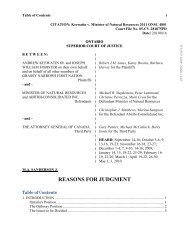COURT OF APPEAL FOR ONTARIO
COURT OF APPEAL FOR ONTARIO
COURT OF APPEAL FOR ONTARIO
Create successful ePaper yourself
Turn your PDF publications into a flip-book with our unique Google optimized e-Paper software.
Page: 63<br />
never intended to invest Bruno‟s money and did not do so. Instead, Hryniak took Bruno‟s<br />
money so that he could make payments to other persons. Thus, Hryniak defrauded Bruno<br />
as he had the Mauldin group.<br />
3. Analysis<br />
(1) Did the motion judge err in holding that it was in the interest of justice<br />
to grant summary judgment?<br />
[144] Hryniak submits that in actions such as these, it is not in the interest of justice for<br />
the motion judge to exercise the expanded powers under rule 20.04(2.1) for the purpose<br />
of granting summary judgment. In essence, Hryniak argues that the motion judge erred in<br />
concluding that a trial was not required to determine his liability.<br />
[145] In our discussion of the amended Rule 20, we identified three types of cases that<br />
are amenable to summary judgment. The first two types of cases existed under the former<br />
Rule 20. The third type of case recognizes that the expanded powers under rule 20.04<br />
permit a motion judge to decide a case summarily where the interest of justice does not<br />
require a trial.<br />
[146] We emphasized, at para. 50, that cases should not be decided summarily where the<br />
full appreciation of the evidence and issues that is required to make dispositive findings<br />
can only be achieved by way of a trial. And we went on to say, at para. 51, an example<br />
of such a case is one that calls for “multiple findings of fact on the basis of conflicting<br />
evidence emanating from a number of witnesses and found in a voluminous record”.
















